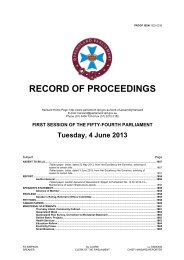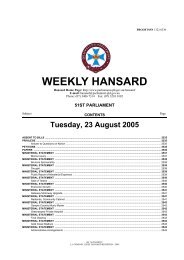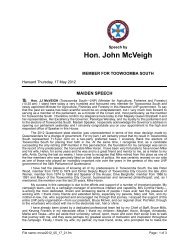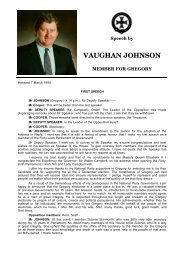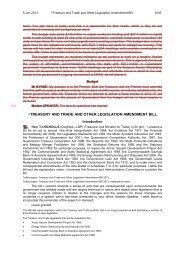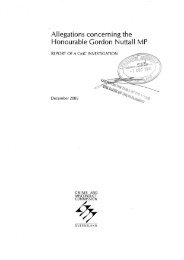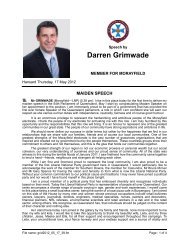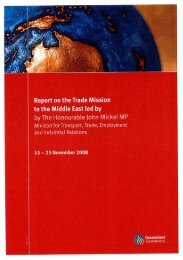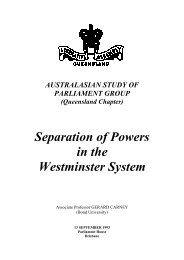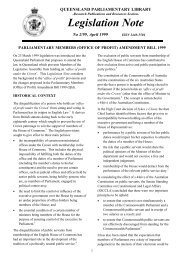Full transcript - Final - Queensland Parliament - Queensland ...
Full transcript - Final - Queensland Parliament - Queensland ...
Full transcript - Final - Queensland Parliament - Queensland ...
You also want an ePaper? Increase the reach of your titles
YUMPU automatically turns print PDFs into web optimized ePapers that Google loves.
9 Mar 1999 Trans-Tasman Mutual Recognition (<strong>Queensland</strong>) Bill 345<br />
the Australia-New Zealand Agreement of 1944<br />
reads as follows—<br />
"There should be cooperation in<br />
achieving full employment in Australia and<br />
New Zealand and the highest standards<br />
of social security both within their borders<br />
and throughout the islands of the Pacific."<br />
How miserably they have failed! Politicians can<br />
rattle off all the statistics they like about how<br />
many jobs they created when they were in<br />
office but they cannot ignore the reality. The<br />
reality is that there are about 2.5 million<br />
unemployed or under-employed people in<br />
Australia, and I believe that in New Zealand<br />
the situation is not much better.<br />
Despite the thousands of treaties that<br />
Australia has signed, unemployment keeps<br />
getting worse, crime is getting worse, drug<br />
abuse is getting worse, and the Trans-Tasman<br />
Mutual Recognition Bill will not make a bit of<br />
difference. The increase in centralisation of<br />
law-making and the shifting of power from the<br />
State Government to the Federal<br />
Government—of which this Bill is an<br />
example—is reducing the justification for State<br />
Governments. The tendency for Australian law,<br />
and by extension State law, to be increasingly<br />
derived from international agreements means<br />
that less and less backbench parliamentary<br />
scrutiny is necessary or desirable.<br />
This is possibly why this Bill and the<br />
parent Commonwealth Act both contain Henry<br />
VIII clauses which allow the Act to be<br />
amended by regulation made by the Executive<br />
arm of Government, completely bypassing the<br />
House. The Governor-General has the power<br />
to change a Commonwealth Act by regulation,<br />
and therefore by virtue of section 109 of the<br />
Constitution the State law as well, completely<br />
bypassing the <strong>Queensland</strong> <strong>Parliament</strong>.<br />
The Scrutiny of Legislation Committee is<br />
rightly suspicious about the Henry VIII clauses<br />
included in this Bill. The predecessor to the<br />
Scrutiny of Legislation Committee, the<br />
Subordinate Legislation Committee, had this<br />
warning about Henry VIII clauses—<br />
"The solution to this problem lies in<br />
<strong>Parliament</strong>'s own hands, for as long as<br />
<strong>Parliament</strong> permits the inclusion in Bills of<br />
clauses which allow the amendment of<br />
Acts by Orders in Council, it will continue<br />
to place the scrutiny and control of its<br />
legislation outside its own power."<br />
Clause 4(1) of this Bill adopts the<br />
Commonwealth Act under Section 51 Part 37<br />
of the Australian Constitution. The more power<br />
the <strong>Queensland</strong> Government gives to the<br />
Commonwealth, the less justification that<br />
remains for the existence and considerable<br />
expense of State Governments.<br />
I see that in Schedule 4 of the Bill medical<br />
practitioners are lucky enough to be exempt<br />
from the operation of the Act. What is the<br />
justification for this exemption? I would think<br />
that dentists, veterinary surgeons, actuaries<br />
and even bricklayers and shearers will all be<br />
cranky when they discover that they now have<br />
to fight New Zealand competitors for a slice of<br />
the business pie.<br />
I notice that the High Court has just<br />
decided that New Zealand television programs<br />
are now classified as Australian content. The<br />
High Court said that our obligations under<br />
international treaties override our domestic law.<br />
I will say it again: the High Court has decided<br />
that international treaties override our<br />
Australian law.<br />
Let there be no doubt in our minds that all<br />
international treaties have legal force and they<br />
override our domestic laws. Even if <strong>Parliament</strong><br />
does not enact legislation to comply with the<br />
treaties, the courts consider them valid, as<br />
numerous decisions of the High Court prove.<br />
Because of this objectionable agreement,<br />
Australia may now have to accept potentially<br />
substandard food and other imports from New<br />
Zealand. These products may contain<br />
pesticides, heavy metals and anything else<br />
that the Australia-New Zealand Food Authority<br />
will permit. I wonder whether people are aware<br />
that the regulations governing the purity of our<br />
foods must now be lowered to meet our treaty<br />
obligations with New Zealand. Our presently<br />
low cadmium limit in foodstuffs must be raised<br />
because the Australian-New Zealand Food<br />
Authority says so.<br />
Australia and New Zealand now have<br />
mutual recognition of occupations and<br />
professions, common food standards, and<br />
even television programming. Suddenly the<br />
concept of a common currency does not seem<br />
so far-fetched. But the question begs to be<br />
asked: just how far will economic and legal<br />
harmonisation be carried with New Zealand<br />
and other countries? At least New Zealand is<br />
an English-speaking nation, fairly similar to our<br />
own. But what will happen when we are forced<br />
to harmonise our laws with foreign countries<br />
which have nothing in common with us and<br />
whose people do not speak English?<br />
This Bill is just one more step in the<br />
creation of a single global monolithic entity in<br />
which Australia is being forced to discard any<br />
valuable consumer protections in the emerging<br />
"one size fits all" world economy. For these<br />
reasons we express our opposition to such a<br />
Bill.



